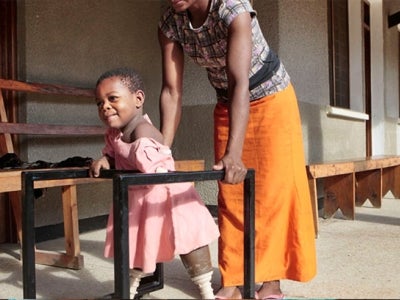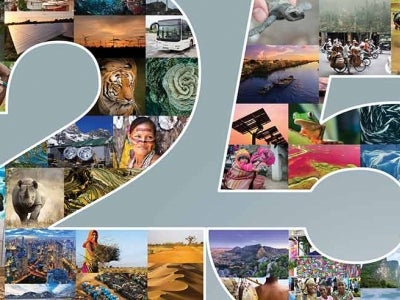
GEF projects introduced the concept of energy efficiency in small South Indian tea processing units, steel re-rolling units and others, ensuring that these small businesses remain competitive and alive, while becoming both responsive and profitable ventures.
By Mr. R. R. Rashmi, Special Secretary, Ministry of Environment, Forest and Climate Change, GEF Operational Focal Point, India
India’s partnership with the Global Environment Facility (GEF) started in 1991 and has grown stronger over the years. The incremental finance and support that the GEF has provided has played a catalytic role in promoting environmentally-friendly techniques and practices which are also economically beneficial and sustainable. India’s portfolio is full of stories which showcase the GEF's role and relevance in a developing country, and it brings global environmental benefits which fit well with the Government of India's priorities.
In 1993, with GEF intervention, India started building institutional and technical capacity for harnessing renewable sources of energy including wind, solar and hydropower. This project commissioned an aggregate capacity of 87 MW of wind, 2 MW of solar and 118 MW of small hydro plants while enhancing private sector participation. The capacity of the Indian Renewable Energy Development Agency Limited (IREDA) was enhanced. The project indirectly played an important role in promoting policy and regulatory changes especially for wind and hydropower.
Another GEF intervention quadrupled the annual area of installations of solar collectors between 2008 and 2012-13 (from 0.4 to 1.6 million sq m) while successfully demonstrating the Energy Service Company concept in the solar water heater sector, and developing a new low-cost, box-type portable solar water heater suited for hilly areas. The project came out with a number of knowledge products for users, designers and installers of solar water heating systems which facilitated their further replication. It also developed model regulations for amendments to bye-laws to make the installation of solar water heaters mandatory in certain categories of residential buildings: based on this, 26 states and some 100 urban local bodies are in the process of amending such bye-laws. Completed renewable energy projects from the GEF's India portfolio have shown that strengthening institutional capacities, promoting enabling environments, developing policy frameworks, and improving the demand for renewable energy technologies can all reduce barriers, mitigate steep transaction costs, and promote underdeveloped markets.
GEF projects introduced the concept of energy efficiency in small South Indian tea processing units, steel re-rolling units and others, ensuring that these small businesses remain competitive and alive, while becoming both responsive and profitable ventures. The steel re-rolling project innovated and successfully piloted “Direct Rolling” which eliminates the need for reheating furnaces, with substantial fossil fuel savings. Encouraged by its results, the Ministry of Steel - the national partner - is actively promoting energy efficiency in the secondary steel re-rolling sector. Another GEF project demonstrated the commercial viability of recovering and using methane, during and after the extraction of coal, as a clean fuel for transport and electricity generation. According to Central Mines Planning and Design Institute Limited, one of the project partners, the country's coal bed methane (CBM) production potential is approximately 3.4 trillion cubic meters (TCM). As of now, 33 CBM blocks have been allotted with a potential to produce about 1.78 TCM and these pilots have been scaled up.
GEF support to India for natural resources has also been remarkable. It has demonstrated that managing natural ecosystems as carbon sinks, and resources for adaptation, is a necessary, efficient and relatively cost-effective strategy. India’s Sustainable Land and Ecosystem Management (SLEM) program underlines that land management is the starting point for addressing all other environmental and related socio-economic issues. SLEM projects show how communities transform the development paradigm, when we empower them. The Uttarakhand and Madhya Pradesh state governments came out with Government Orders to promote community participation in conserving and managing forest resources while integrating the SLEM approach. This has improved the income, livelihood options and well-being of the local population while ensuring conservation, regeneration and the efficient use of the region’s natural resources. Participatory climate monitoring and farmer climate schools have built the capacity and capability of local farmers in selected villages of Andhra Pradesh to understand the daily climate and seasonal variability governing their cropping pattern and practices etc. GEF interventions have not only actively promoted the effective use of technology to manage natural resources but have made it simple enough for the local communities to use it by linking it with their mobile handsets, as with mKrishi Agriculture, mKrishi Fisheries, daily climate forecasts – again improving communities' lives and livelihoods.
Knowledge empowers, and this has also been showcased by GEF projects and recognised and mainstreamed into government programs. The GEF has created an enabling environment by promoting multi-stakeholder consultations, institutional and technical capacity building, knowledge products, and facilitating policy and regulatory frameworks etc., thus leading to longer term benefits. It is also supporting national reporting obligations to MEAs.
So far, India has accessed more than USD 516 million of GEF grants and leveraged about USD 3 billion as co-funding. The share of multi-focal area projects in our portfolio is growing, indicating the country’s integrated approach towards addressing environmental challenges. India has been focusing on developing projects with high visibility, high impact and high replication.
The most satisfying outcome of GEF projects is the impact that they have made on the lives and livelihoods of the people concerned. After years of project completion, the work not only survives but is fondly remembered by the implementing partners as valuable investments.
The role of the GEF remains critical for developing countries like India. Faced with innumerable development imperatives, the GEF partnership is uniquely placed to help buttress Earth’s life support systems and to achieve the 2030 Agenda on Sustainable Development.


